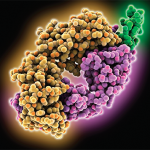 NEW YORK (Reuters Health)—Long-term rituximab use lowers the chance of relapse of anti-neutrophil cytoplasmic antibody (ANCA) associated vasculitis (AAV), compared with standard maintenance therapy, according to a report from the MAINRITSAN3 randomized trial.
NEW YORK (Reuters Health)—Long-term rituximab use lowers the chance of relapse of anti-neutrophil cytoplasmic antibody (ANCA) associated vasculitis (AAV), compared with standard maintenance therapy, according to a report from the MAINRITSAN3 randomized trial.
“Physicians should consider AAV to be a long-lasting, chronic disease which requires maintenance therapy,” says Dr. Pierre Charles of Cochin Hospital, Paris Descartes University, and Institut Mutualiste Montsouris, Paris.
“Many patients (e.g., patients who already experienced a relapse, patients with anti-PR3-ANCA) should receive at least 4 years of maintenance therapy, but this maintenance therapy could be extended,” he tells Reuters Health by email.
The earlier MAINRITSAN trial demonstrated clear superiority of rituximab over azathioprine for maintaining remission in patients with AAV. Both the U.S. Food and Drug Administration and the European Medicines Agency recommend rituximab 500 mg on days 0 and 14 and then at months 6, 12 and 18 to maintain AAV remission.
In the MAINRITSAN3 trial, Dr. Charles and colleagues evaluated the efficacy of prolonging the rituximab infusion schedule another 18 months to maintain remission in patients who achieved complete remission after the first phase of rituximab maintenance therapy.
The 50 patients assigned to rituximab received a 500-mg fixed dose of rituximab intravenously at randomization and at months 6, 12 and 18. The 47 patients assigned to the control group received placebo at the same times.
Relapse-free survival at 28 months, the primary endpoint, was 96% in the rituximab group vs. 74% in the placebo group, a significant difference, the researchers report in Annals of Internal Medicine.1
Six patients in the placebo group (vs. none in the rituximab group) had major relapses, received a new induction regimen with high-dose glucocorticoids and rituximab, and achieved remission.
The two groups did not differ significantly in Vasculitis Damage Index scores at the end of the trial or in quality-of-life outcomes over the course of the study.
Cumulative mean glucocorticoid doses after randomization did not differ significantly between the groups, and at the end of the trial 39% of patients in the rituximab group and 50% of patients in the placebo group were still receiving glucocorticoids.
Adverse event and serious adverse event rates did not differ significantly between the rituximab and placebo groups.
“The prolongation of maintenance therapy with rituximab 500-mg fixed-dose every six months for four years is efficient and should be considered in AAV patients,” Dr. Charles concludes.
He adds, “Some questions remain unanswered: should we treat all AAV patients with extended rituximab therapy or should we propose this new strategy to an AAV population considered at high risk of relapse? The optimal duration of maintenance therapy is not yet determined (and it will not be easy to answer this question in a trial), but we can think that some patients require very-long-term rituximab therapy.”

